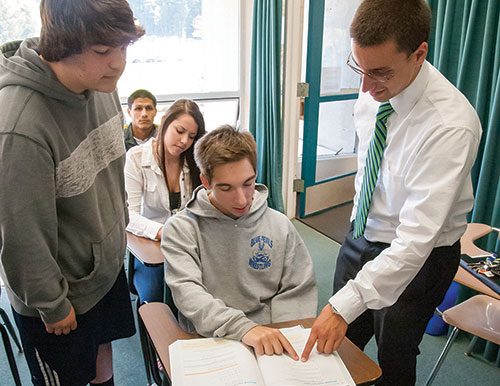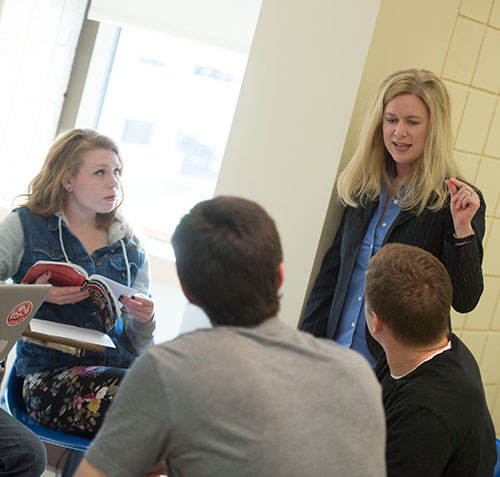
In a highly decentralized system of public higher education like the one in Massachusetts, it’s rare to find biology or political science professors from UMass, state universities, and community colleges gathering for any reason—let alone to assess curricula or weigh which courses are comparable enough to transfer. Yet this is exactly what happened when educators sat down in a series of cross-sector meetings, discipline by discipline, bargaining and cajoling their way to agreement on a new, seamless system of transfer pathways set to debut in fall 2016.
“These conversations only worked because we got faculty together from across the system, people who had never talked to each other before,” said Commissioner Santiago recalls, adding with a chuckle, “We locked the doors and said, ‘No one’s leaving until we get this done.’”
And they did it: Supported by the Vision Project Performance Incentive Fund, faculty from six different disciplines developed new 60-credit course maps called MassTransfer Pathways that lay out the first two years of a four-year baccalaureate degree, making it possible for students to transfer to a state university or UMass campus without losing any credits or having to take extra classes. Ten more disciplines have been agreed to, and their maps are in the final stages of development. In order to forge the agreements, some campuses needed to alter the content of classes to align with other institutions.
“It was, frankly, invigorating to meet with my history colleagues from around the state,” said Chris Laney, Berkshire Community College professor and MassTransfer segmental leader for history. “The meetings were genial and productive, and I believe the results will greatly improve the transfer process for students.”
Students will be able to view the pathways on an interactive website being developed by the Department of Higher Education. The online system will show students a course map for their first four semesters, including general education, major and elective classes. The transfer pathways are the foundation of the new Commonwealth Commitment to Access, Affordability and Completion program recently signed by the presidents of all public colleges and universities.

In 2016 the Board of Higher Education extended a systemwide pilot that seeks to overhaul developmental math barriers to college completion. Twenty campuses now use high school GPA instead of or in addition to Accuplacer testing to assess whether students are ready for college-level math. Preliminary results at community colleges and UMass campuses show that, between students who were placed in college-level math by Accuplacer versus GPA, course completion rates were nearly equivalent. At the state universities, students who were placed according to high school GPA fared better: 91 percent completed a college-level math course, compared to 84 percent of students placed by Accuplacer results.
For those students who place into developmental math, two of the most successful approaches being utilized by campuses—here in Massachusetts, and nationwide—are the so-called corequisite remediation model and the creation of alternative math pathways that align with students’ majors. Students enroll directly into college-level courses and receive academic support alongside their regular classes. A spring 2016 report by Complete College America found the corequisite model, when combined with the use of new pathways, is doubling and tripling gateway college course success rates in half the time or better.
Here in Massachusetts, Westfield State University has been a leader in using the corequisite approach since 2005. Students are assigned to 100-level math classes based on their major; Westfield added a supplemental instruction program for students who failed the Accuplacer test, and requires those students to meet an extra hour per week in extended time sections. Today, there are no stand-alone prerequisite developmental classes offered at Westfield State.
The changes are yielding promising results. A study conducted last year for students who failed the Accuplacer test and enrolled in Mathematics for Business and Social Sciences found that only six percent of those in extended time sections had withdrawn and only three percent had failed, compared to 33 and 11 percent of students placed into regular classes without extended time support.

Mount Wachusett Community College’s Math Modeling program helps students avoid the financial and psychological toll of having to take noncredit developmental classes in college. Instead, The Mount brings remediation directly to seniors at its feeder high schools. Since it began in 2013 with 105 students, the program has nearly quadrupled in size and continues to expand.
College faculty and local school math teachers collaborated jointly in developing MWCC’s four-credit Foundations of Mathematics course curriculum. From its beginnings at Leominster High School and the Leominster Center for Technical Education Innovation, the program has grown to include five additional high schools in North Central Massachusetts. This academic year 388 students participated; two additional high schools will join during the 2016–17 academic year.
MWCC’s Foundations in Mathematics Outcomes:
Massachusetts College of Liberal Arts (MCLA) has earned the distinction of being the only public four-year college in New England to “outperform (its) peer institutions in enrolling and graduating Pell Grant recipients,” according to the U.S. Department of Education.
For the first time this year, the Department is scoring colleges on the number of low-income students they enroll and the number they see through to graduation day, amid rising concerns that too many of these students never earn college credentials. Forty-five percent of MCLA’s students are Pell-eligible, which means their families earn less than $40,000 a year. Typically, colleges and universities report a substantial gap between the number of low-income students who enroll and the number who actually graduate, but at MCLA the six-year graduation rate for Pell-eligible students is only four points below the rate for all students.
“It’s quite remarkable that a small liberal arts college in the Berkshires has succeeded in achieving what so many other colleges and universities are attempting to do, which is to give low-income students access to earning a college degree,” said MCLA President James F. Birge. “While our professors provide vital academic support and encouragement, our admissions and financial aid employees dedicate themselves to ensuring that our students—some of whom may not otherwise have had an opportunity to attend an institution of higher education—maintain the means to persist and earn their bachelor's degree. I’m very proud of the results we’re seeing; it’s an honor to be recognized by the U.S. Department of Higher Education for our work.”

Worcester State University is the first public institution in Massachusetts to recruit faculty and staff “success coaches” to improve student retention. Twenty-nine faculty and staff from across campus divisions, bargaining units, and job classifications were chosen to communicate with students who showed two or three indicators of non-cognitive retention risk under Worcester’s predictive model.
Success coaches offer early semester check-ins with students. They review the results of the student’s non-cognitive risk survey results, go over any “early alert” flags on academic performance, make referrals to support offices, and assist students in building connections with Worcester State.
Preliminary results from the first semester show that of 137 students assigned a coach, 116 persisted to the spring semester.
“This modest success, combined with students’ extremely positive comments about their coaches and an institutional commitment to addressing students’ non-cognitive risk factors, will ensure that this pilot continues at Worcester State,” said Ryan Forsythe, vice president for enrollment management at Worcester State. “Scaling this will be a challenge that we look forward to addressing!”